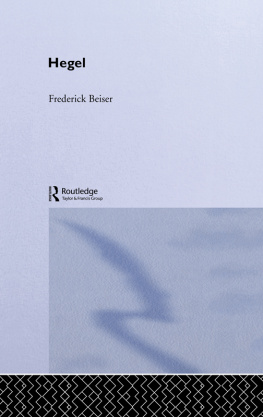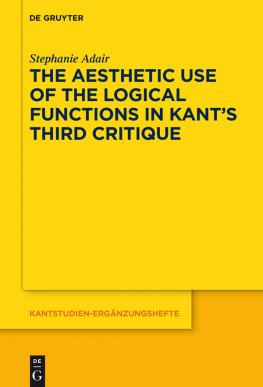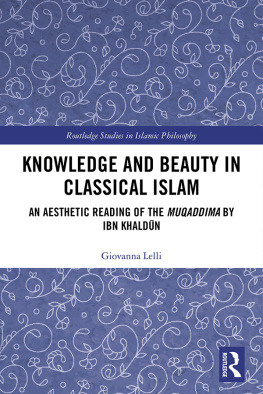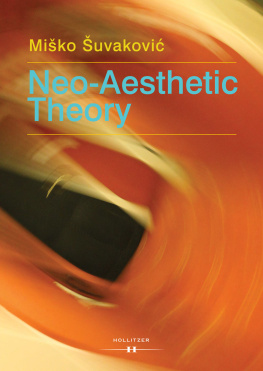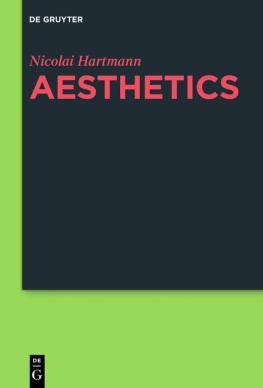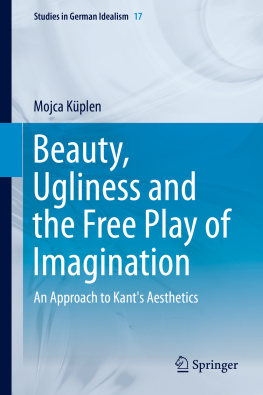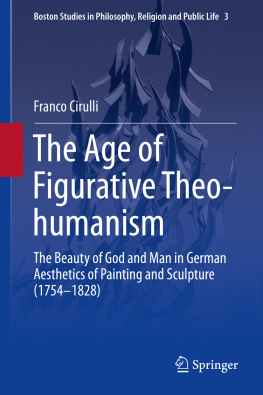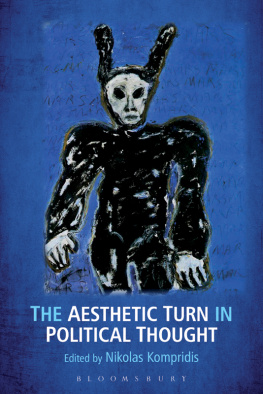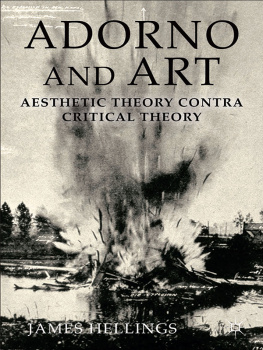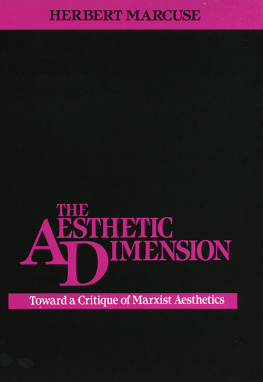Diotimas Children
Diotimas Children
German Aesthetic Rationalism from Leibniz to Lessing
Frederick C. Beiser


Great Clarendon Street, Oxford ox2 6DP
Oxford University Press is a department of the University of Oxford.
It furthers the Universitys objective of excellence in research, scholarship,
and education by publishing worldwide in
Oxford New York
Auckland Cape Town Dar es Salaam Hong Kong Karachi
Kuala Lumpur Madrid Melbourne Mexico City Nairobi
New Delhi Shanghai Taipei Toronto
With offices in
Argentina Austria Brazil Chile Czech Republic France Greece
Guatemala Hungary Italy Japan Poland Portugal Singapore
South Korea Switzerland Thailand Turkey Ukraine Vietnam
Oxford is a registered trade mark of Oxford University Press
in the UK and in certain other countries
Published in the United States
by Oxford University Press Inc., New York
Frederick C. Beiser 2009
The moral rights of the author have been asserted
Database right Oxford University Press (maker)
First published 2009
All rights reserved. No part of this publication may be reproduced,
stored in a retrieval system, or transmitted, in any form or by any means,
without the prior permission in writing of Oxford University Press,
or as expressly permitted by law, or under terms agreed with the appropriate
reprographics rights organization. Enquiries concerning reproduction
outside the scope of the above should be sent to the Rights Department,
Oxford University Press, at the address above
You must not circulate this book in any other binding or cover
and you must impose the same condition on any acquirer
British Library Cataloguing in Publication Data
Data available
Library of Congress Cataloging in Publication Data
Beiser, Frederick C., 1949
Diotimas children: German aesthetic rationalism from Leibniz to
Lessing / Frederick Beiser.
p. cm.
Includes bibliographical references and index.
ISBN 9780199573011 (hardback: alk. paper) 1. Aesthetics,
German17th century. 2. Aesthetics, German18th century. 3.
Rationalism. 1. Title.
BH221. G32B45 2009
700. 1dc22
2009029699
Typeset by Laserwords Private Limited, Chennai, India
Printed in Great Britain
on acid-free paper by
The MPG Books Group, Bodmin and Kings Lynn
ISBN 9780199573011
10 9 8 7 6 5 4 3 2 1
In Memoriam
Theo Eichheim
(19362008)
Preface
This study grew out of the conviction that the only way forward in aesthetics is to go backwards. To avoid the aporias of the present, we must recover the aesthetic tradition before Kant, especially the tradition of aesthetic rationalism from Leibniz to Lessing, which links the early modern era with the classical past. A proper study of that tradition teaches us the importance of beauty in life, the intimate connection of beauty with truth and goodness, the necessity of rules, the importance of taste, and the cognitive dimension of aesthetic experience. All these doctrines were rejected by Kant, but on the basis of a hasty polemic and limited taste. Contemporary aesthetics has rested on Kants polemic, but the cost has been great: aesthetics no longer has a content. Anything, even soup cans and urinals, are works of art.
I advocate not the wholesale rehabilitation of rationalist aesthetics, only the re-examination of its central themes. While the neo-classical age is gone forever, many of its fundamental ideas are of lasting importance. Even if one rejects them, it is at least important to know why. This means we need to reconstruct the intellectual foundations of the rationalist tradition. Those foundations are much stronger than many suspect. In the final analysis, they rest on two unshakable pillars: the principle of sufficient reason and the authority of Diotima.
While this study touches upon contemporary aesthetics, it is chiefly meant as a contribution to historical scholarship. I have attempted to sketch the broad contours of the rationalist tradition in Germany from Leibniz to Lessing. While there have been many studies focused on individual thinkers, there has been none devoted to the tradition as a whole. Hopefully, taking this broader view will help us see the forest as well as the trees.
This study does not pretend to be a complete history of aesthetic rationalism in Germany. It aims to cover only its central figures, those who had the greatest influence. A complete history would have to include many so-called minor players whom I have not treated here. Among them would be Christoph Martin Wieland, Friedrich Nicolai, Karl Phillip Moritz, Johann Georg Sulzer, and J. J. Bodmer and J. J. Breitinger. I originally intended to include short chapters on these thinkers but eventually found I had no space for them in a single volume.
No parts of this work have been published before. Early versions of the Introduction were given as the ONeil lectures at the University of New Mexico; parts of other chapters were the basis for lectures at Vassar, Brown, and Boston University. I am very grateful to the participants at those colloquia for their comments.
My debts to past scholarship will be plain from the footnotes. Many are to scholars long dead and books long forgotten; but I also have great debts to the living, especially to my many undergraduate and graduate students at Syracuse University, where I have taught aesthetics for the past seven years. The comments of several anonymous external reviewers were helpful in revising the manuscript. Andrew Chignells detailed commentary on the entire manuscript proved invaluable. This project was encouraged in its early stages by my friend and ex-colleague at Indiana University, Michael Morgan, to whom I have, as usual, special debts.
F.B.
Syracuse, New York
February 2009
Introduction: Reappraising Aesthetic Rationalism
1. A Glorious Relic?
Few traditions of aesthetic thought, whether in ancient or modern times, were as long and glorious as that of aesthetic rationalism in Germany. This movement included some of the leading thinkers of the eighteenth century, among them Christian Wolff (16791754), Johann Christoph Gottsched (170066), Alexander Baumgarten (171462), Johann Joachim Winckelmann (171768), Moses Mendelssohn (172986), and Gotthold Ephraim Lessing (172981). It lasted some sixty years, beginning with Wolffs early works in the 1720s and ending with Lessings death in 1781. The cultural achievements of this movement were immense: it raised the standards of literary criticism; it founded modern art history; it created the very discipline of aesthetics; and it inspired the formation of a national literary tradition, such that Germany could vie with France and England as one of the great intellectual cultures of Europe. Rarely in history has aesthetic thought been so central to philosophy, and rarely has it been so vital to a culture as a whole. If only on these historical grounds, we have strong reasons to study aesthetic rationalism.
Nevertheless, interest in aesthetic rationalism nowadays is bound to seem strictly antiquarian. Although we have good historical reasons to study it, it seems we do not have good philosophical reasons. For rationalist aesthetics no longer speaks to our post-modern age; it seems entirely obsolete, as musty and fusty as the perukes that once crowned the rationalists heads. We can no longer share their self-confident rationalism, their narrow aesthetics of beauty, their belief in classical authority, their faith in aesthetic rules, their neo-classical taste. They seem to belong to an altogether more naive and innocent age, now gone forever. And, to be sure, there can be no going back to the age of aesthetic rationalism, no revival of its grand ideals or central doctrines. We are no more likely to reinstate aesthetic rationalism than we are to wear wigs, stockings, and breechcoats.
Next page


